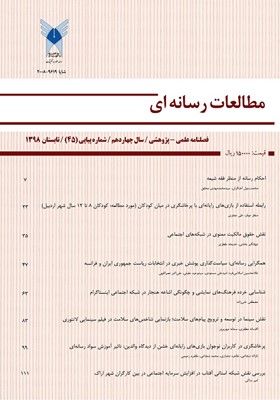نقش حقوق مالکیت معنوی در شبکه های اجتماعی
محورهای موضوعی : مدیریت رسانهخدیجه ططری 1 * , جهانگیر بخشی 2
1 - علوم ارتباطات . دانشگاه سوره.دانشکده ارتباطات
2 - علوم ارتباطات .دانشگاه پیام نور
کلید واژه: شبکه های اجتماعی, سازمان بین المللی مالکیت معنوی, حقوق مالکیت معنوی,
چکیده مقاله :
امروزه با استفاده از شبکه های اجتماعی و باحضور در این بزرگراه، امکان بهره گیری از انبوهی از اطلاعات در کمترین زمان ممکن و برقراری ارتباط گفتاری نوشتاری و دیداری با هزینه ای نسبتاً کم فراهم آمده است. ظهور این پدیده اگرچه خود معلول تحولاتی چند بوده اما پس از ظهور، خود منشاء تحولات عدیده ای به ویژه در عرصه علوم ارتباطات به مفهوم اخص کلمه شده است. در این پژوهش به بررسی حقوق مالکیت معنوی کاربران شبکه های اجتماعی پرداخته شده است. حقوق مالکیت معنوی را، در معنای وسیع کلمه، حقوق ناشی از آفرینشها و خلاقیتهای فکری در زمینههای علمی، صنعتی، ادبی و هنری میداند. با توجه به پیشرفت تکنولوژیهای نوین ارتباطی بحث حقوق مالکیت معنوی کاربران شبکههای اجتماعی همواره مورد سؤال بوده است که آیا در فضای گسترده مجازی امکان این امر وجود دارد که حقوق کاربران شبکههای اجتماعی حفظ شود که تا کنون پزوهشی در این خصوص که به بررسی حقوق مالکیت معنوی کاربران شبکه-های اجتماعی بپردازد صورت نگرفته است. در این پژوهش به بررسی حقوق مالکیت معنوی کاربران شبکه-های اجتماعی(فیس بوک، توییتر، جی پلاس، لینکدین و آپارات) پرداخته شده است که با استفاده از روش پیمایشی و ابزار پرسشنامه ای 225 نفر از کاربران شبکههای اجتماعی با استفاده از روش نمونهگیری تصادفی ساده انتخاب شده اند.
Nowadays, using social networks and the public on this highway, it is possible to use a great deal of information in the shortest possible time and to provide written and visual speaking with a relatively low cost. The emergence of this phenomenon, although self-evident, has caused several changes, but after its emergence, the very origins of many developments, in particular in the field of communications science, have been spelled out to be specific. In this research, the intellectual property rights of social network users have been investigated. Intellectual property rights, in the broadest sense of the word, are the rights derived from creations and intellectual creations in scientific, industrial, literary and artistic fields. Given the advancement of modern communication technologies, the issue of intellectual property rights of social network users has always been questioned whether in a wider virtual space it is possible to maintain the rights of social networking users who are still promising in this regard Which does not examine the intellectual property rights of social network users. In this research, the intellectual property rights of social network users (Facebook, Twitter, GPL, LinkedIn and Aparat) were investigated. Using survey and questionnaire tool, 225 social network users using Simple random sampling method was chosen
_||_

